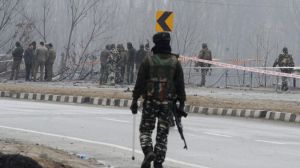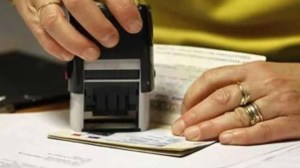In Valley of mistrust, Omar & Yasin share a stage, some views
When National Conference president Omar Abdullah today shook hands and exchanged smiles with separatist leader Yasin Malik in a dimly lit co...

When National Conference president Omar Abdullah today shook hands and exchanged smiles with separatist leader Yasin Malik in a dimly lit college auditorium here, there were no cameras, no anchors, no restless reporters.
It was much more than a routine encounter between rival politicians in a TV studio. In the Valley of mutual mistrust, this was a tiny step to rebuild a culture of tolerance and dialogue. And on this rare occasion, Abdullah and Malik presented their vision for Kashmir’s future and responded to a barrage of sharp and bitter questions from 270 Kashmiri youngsters, mostly students.
Unlike recent Valley tradition, this first public trial of two important Kashmiri political leaders from either side of the ideological divide was a calm and polite discussion with no shouting, no slogans, no harsh words.
The end was interesting, too: the two leaders, divided by a wide gulf of political ideology, vision for Kashmir and backgrounds, actually came close to a meeting ground.
Abdullah said he was open to a resolution to Kashmir that transcends his party’s agenda of maximum autonomy and described all Kashmiris killed in the past 16 years of the separatist movement as martyrs.
Malik talked about his movement’s roots in the NC, saying, ‘‘We are the revolutionary part of NC who did not accept the 1975 Kashmir accord.’’ For him, political corruption and lack of credibility formed a major crisis for Kashmiris.
The two leaders agreed on another view that will have far-reaching political implications: their distance from New Delhi and Islamabad.
Abdullah said, ‘‘Don’t think we (Kashmiris) have friends in New Delhi or Islamabad’’. And after Malik raised the peace process, he ended up with a similar argument, saying that Kashmiris didn’t trust either New Delhi or Islamabad. He said the decision to reopen the Muzaffarabad road came as a surprise as Kashmiris were never near the negotiating table.
There was, however, anger too. The students grilled Abdullah on his party’s role in the official crackdown during NC rule, human rights violations and changing stance on the Kashmir issue.
He was asked why he didn’t join the separatists if he thought Kashmir didn’t have friends in New Delhi; questions were raised on his party’s alliance with BJP, a party that opposes autonomy to Kashmir.
Malik was not spared, too. He was asked how he claimed to represent Jammu where its people are pre-dominantly ‘‘pro-India’’; they wanted him to elaborate on and name the faces behind the corruption he had referred to.
The debate was organised by the J&K Coalition of Civil Society, an apolitical voluntary organisation established by a group of lawyers, doctors, teachers and students in June 2000 to ‘‘restore traditions of dialogue and transparency within Kashmiri society’’.
Photos





- 01
- 02
- 03
- 04
- 05


























